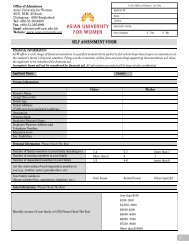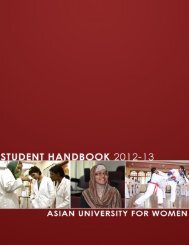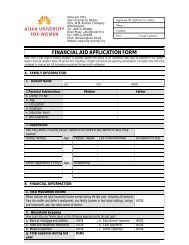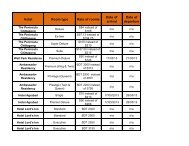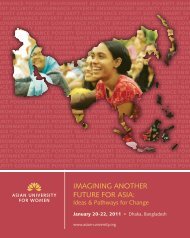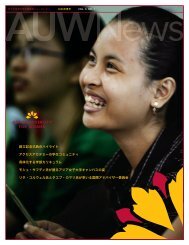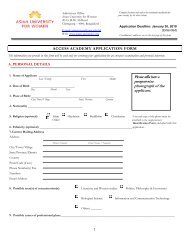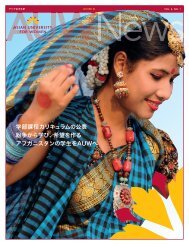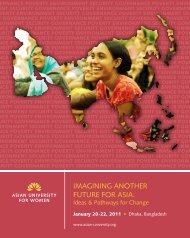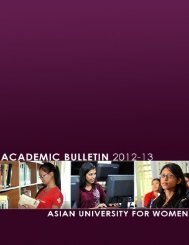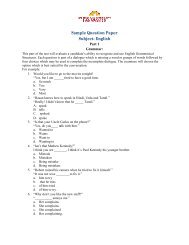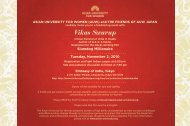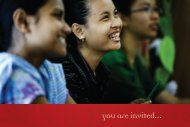Fall 2010 - Asian University for Women
Fall 2010 - Asian University for Women
Fall 2010 - Asian University for Women
Create successful ePaper yourself
Turn your PDF publications into a flip-book with our unique Google optimized e-Paper software.
22<br />
OCTOBER <strong>2010</strong> VOL. 4, NO. 2<br />
Condoleezza Rice: An Academic at Heart<br />
It is safe to say that Condoleezza Rice has shattered a fair number<br />
of glass ceilings in her day.<br />
But of all the challenging posts she has held in<br />
her illustrious career—U.S. Secretary of State,<br />
senior advisor on Soviet and Eastern European<br />
affairs <strong>for</strong> the White House during the disintegration<br />
of the Soviet Union, the first woman and<br />
only the second African-American to serve as<br />
National Security Advisor—she says it was a job<br />
in academia, not government, that presented her<br />
biggest professional challenge.<br />
Dr. Rice says she was taken aback when she first<br />
learned of her nomination to be provost of<br />
Stan<strong>for</strong>d <strong>University</strong>; she was the youngest and<br />
the first African-American female to hold the<br />
post. Then just 38 years old, she was a lightweight<br />
contender in the boxing ring of academic<br />
hierarchies. “I remember saying to the communications<br />
director, ‘Well, I’ve never even been a<br />
department chair,’” she says. When he<br />
responded that she had, however, managed<br />
U.S.-Soviet relations, Dr. Rice replied, laughing:<br />
“‘Yes, but [Soviet General Secretary] Mikhail<br />
Gorbachev doesn’t have tenure.’”<br />
Dr. Rice appears more com<strong>for</strong>table characterizing<br />
herself as an academic than a politician; she<br />
describes the political accomplishments of her<br />
career as extended departures from what was an<br />
otherwise natural trajectory into the academic<br />
world. “I never considered Washington a permanent<br />
home,” she explains when discussing her<br />
desire to return to academia.<br />
Dr. Rice’s devotion to education stretches back<br />
to her grandfather, who was the first person in<br />
her family to earn a university degree. He saved<br />
up the profits from his cotton sales to pursue<br />
“book-learning,” not an easy feat <strong>for</strong> a black<br />
man living in the segregated South. When his<br />
funds ran out, he obtained a scholarship with<br />
the stipulation he become a Presbyterian minister.<br />
Hence<strong>for</strong>th, a reverence <strong>for</strong> both education<br />
and the Presbyterian Church went hand-in-hand<br />
in the Rice household. Her family has been<br />
college-educated ever since.<br />
Given her passion <strong>for</strong> education, it is no surprise<br />
that Dr. Rice supports the <strong>Asian</strong> <strong>University</strong> <strong>for</strong><br />
<strong>Women</strong>. Since becoming a Patron of the<br />
<strong>University</strong> in 2009, she has brought her considerable<br />
knowledge of both international affairs and<br />
universities to bear, a powerful combination in<br />
AUW’s ambitious quest to change the landscape<br />
of women’s higher education in Asia. In doing<br />
so, Dr. Rice has also served as a role model to<br />
the many AUW students who draw inspiration<br />
from her life path.<br />
Dr. Rice was born in the segregated city of<br />
Birmingham, Alabama, into the heart of the civil<br />
rights struggle. Throughout her childhood the<br />
city was ravaged by violent protests; in 1963, one<br />
of her friends died in the infamous Birmingham<br />
“… my parents and my friends’ parents really raised us to believe<br />
that we could do anything we wanted to do and be anything we<br />
wanted to be, and that the key to it was to get a good education.”<br />
church bombing that killed four little girls on a<br />
Sunday morning. In the midst of this political and<br />
social turmoil, the young Condoleezza Rice<br />
remained devoted to her studies, encouraged by<br />
parents who insisted that education was the<br />
gateway to a better life. “The remarkable thing<br />
to me is that despite the circumstances of<br />
Birmingham my parents and my friends’ parents<br />
really raised us to believe that we could do anything<br />
we wanted to do and be anything we<br />
wanted to be, and that the key to it was to get a<br />
good education,” she says.<br />
Dr. Rice enrolled in the <strong>University</strong> of Denver as an<br />
undergraduate and originally pursued a major in<br />
music with hopes of becoming a concert pianist.<br />
She had recently come to the realization that her<br />
future as a great pianist was a limited one—“I<br />
knew that I might end up teaching 13-year-olds to<br />
murder Beethoven,” she jokes—when she took a<br />
course with Soviet specialist Josef Korbel, who<br />
also happened to be the father of <strong>for</strong>mer<br />
Secretary of State Madeleine Albright. This “flash<br />
of a class” sparked an enduring love <strong>for</strong> political<br />
science and impressed upon Dr. Rice a lifelong<br />
passion <strong>for</strong> teaching. “I love being a professor<br />
because you can really open up worlds to your<br />
students and make them see things differently.…<br />
And I suspect that at some point Dr. Korbel saw<br />
that light go on in me,” she says.<br />
Dr. Rice went on to become a professor of political<br />
science at Stan<strong>for</strong>d <strong>University</strong>—a position she<br />
holds today—and then provost. While at<br />
Stan<strong>for</strong>d she met Brent Scowcroft, who had<br />
served as Gerald Ford’s National Security<br />
Advisor. He later appointed Dr. Rice to the<br />
George H. W. Bush’s National Security Council as<br />
the Special Assistant to the President <strong>for</strong> Soviet<br />
affairs, and so began a meteoric political career.<br />
Still, Dr. Rice always returned to her roots. She<br />
explains: “I belong in a university … every time I<br />
go to government and come back to the university<br />
I think I strengthen and make deeper my<br />
ability to reach students and teach, and every<br />
time I go back into government, I’ve taken the<br />
opportunity in the academy to reflect and<br />
develop new ideas.”<br />
She understands acutely the vital role of an institution<br />
like AUW in the developing world. “I<br />
believe if you want to do something about<br />
uncontrolled population growth, then educate<br />
women and they won’t have children at age 12. If<br />
you want to do something about human trafficking,<br />
educate women and they won’t get into that<br />
circumstance. If you want to do<br />
something about poverty, educate<br />
women and they will create circumstances<br />
to educate their daughters<br />
and their sons and so on and so<br />
on. I think education of women<br />
internationally is really the key to a<br />
much better world, period,” she<br />
says.<br />
She points to the ripple effect AUW can have<br />
throughout the region. “I suspect that when<br />
these daughters come back into their villages<br />
and into their towns, and people see what’s happened,<br />
more and more families will want their<br />
daughters to have this kind of opportunity.”<br />
Though Dr. Rice urges students at AUW to steel<br />
themselves against the challenges they may face<br />
on their paths toward becoming leaders in the<br />
region, she also cautions them against planning<br />
every step along the way. Back at Stan<strong>for</strong>d, her<br />
students often ask her how they can become the<br />
next Secretary of State. “You start as a failed<br />
piano major,” she says.<br />
CONDOLEEZZA RICE



